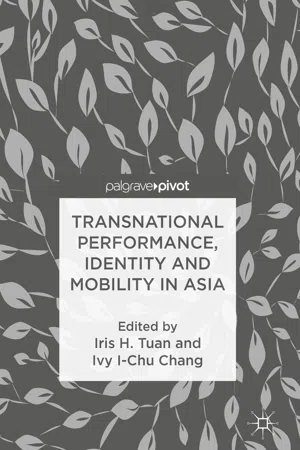Encountering the Alienated Self by and Through the Foreign
Since the mid-twentieth century, the innovation of traditional Asian theater has often been driven by two impulses: one is to utilize Western canons like Shakespeare as a cultural capital to showcase Asian performance on a global stage; the other is to appropriate elements from Asian or Western popular culture in order to rejuvenate traditional Asian theater, bringing it closer to young people and quotidian lives. Paradoxically, as many innovators look up to Western theater or popular cultural symbols and icons to trigger their creative potential, they often look for novelty from foreign cultural forms and ideas that have originated and grown from their own cultures and then returned as what Anthony Tatlow calls “an alienating echo or transmutation of undeveloped inherent possibilities” (Tatlow 2001, p. 78). This can be exemplified by the experience of those Asian theater artists who seek recourse to Western avant-garde directors such as Brecht , Grotowski , and Artaud whose fundamental methods have been respectively inspired or reinforced by Chinese jingju, Indian kathakali , and Balinese ritual .1 Similarly, for those who appropriate elements from Western or Asian popular culture, they might encounter their cultural past that has already been reimagined and recycled through foreign eyes in the “simulacra and simulation machine ” (Baudrillard 1988, pp. 164–84) of cultural industries. In the postmodern “time–space compression ” (Harvey 1990, p. 284), the uncanny feeling of encountering one’s alienated self is sometimes not so much a sense of déjà vu as what Ackbar Abbas calls the sense of déjà disparu : “the feeling that what is new and unique about the situation is already gone, and we are left holding a handful of clichés, or a cluster of memories of what has never been” (Abbas 1997, pp. 25–6).
Wu Hsing-kuo (吳興國) and the Contemporary Legend Theatre’s (CLT) (當代傳奇劇團) innovation of jingju have made palpable the aforementioned two impulses. Beginning in the mid-1980s, Wu and the CLT utilize Western canons such as Shakespeare as a vehicle to make their jingju productions more universally appealing to the global stage and international theater festivals. For instance, The Kingdom of Desire (《慾望城國》), an adaptation from Macbeth , premiered in 1986. From 1990 to 2005, The Kingdom of Desire made thirteen worldwide tours—with the government’s handsome sponsorship—in prominent international theater festivals or national theaters to promote jingju as a Chinese cultural paradigm through Shakespearean story that seemed more familiar to Western audiences .2
The vicissitude and jingju innovation of the CLT have been entangled with the transition from Chinese nationalism to Taiwanese nationalism during Taiwan’s socio-political change. In Taiwan, jingju innovation often arouses controversy and resistance because it has long been regarded as the national theatrical form intertwining cultural identity, national pride, and nationalist sentiment. Since the KMT (Kuomintang) government was defeated by the Communist party and withdrew from the mainland China to Taiwan after the 1949 Civil War, the KMT government’s national cultural policies of protecting jingju have been a double-edged sword. On the one hand, jingju has been sustained to promote Chinese nationalism through the Ideological State Apparatuses and government sponsorship. On the other hand, within an enclosed institution and system, jingju has been preserved in such a rigid form that it has been so far away from quotidian lives. Turning to the 1970s, jingju has been a vehicle to promote Taiwan’s image as “cultural China” on a global stage, since Taiwan had encountered unprecedented political and diplomatic set back and lost its international political stage to the People’s Republic of China . The CLT and their jingju innovations based on Shakespearean adaptations were sponsored generously by the government to perform on the global stage to promote Taiwan as the true heir of Chinese culture.
However, turning to 1996, the year Lee Teng-hui was elected as president, Taiwan’s government put Taiwanese nationalism into the cultural policies and practices, and then the CLT encountered increasing difficulties in receiving grants. Besides, they had no full-time actors and hence had to cooperate with the actors of Guoguang Opera Company. However, at that time Guoguang had to carry the mission of vernacularizing jingju by frequently performing in temple squares, schools, and local communities , rendering those repertoires that promoted Taiwanese consciousness and the stories of Mazu (媽祖 Taiwanese goddess), Zheng Chenggong (鄭成功 a Ming-dynasty general pioneering the settlement in Taiwan, also known as Koxinga ), and Liao Tianding (廖添丁 an anti-Japanese hero during Japanese colonization ) (Lu 2006, p. 202).
In December 1998, Wu and his wife Lin Hsiu-wei frustratedly announced the disbanding of their troupe. In 2000, Wu was invited by Ariane Mnouchkine to teach the workshop in the Theatre de Soleil . Wu produced a twenty-five-minute solo performance titled Lear Is Here , an adaptation of King Lear , to incorporate various jingju role types and acting skills. This was later expanded to a ninety-minute performance, winning international acclaim comparable to Kingdom of Desire in various theater festivals (p. 207). With his interest and passion in jingju innovation rekindled by Mnouchkine and Western audiences , Wu reopened the CLT after he had returned to Taiwan . The CLT’s story explicates the jingju innovators’ alienation from their own artistic identity by the intervention of Ideological State Apparatuses while reencountering their alienated self by rediscovering their own values through the foreign.
Turning to the twenty-first century, with the rising of China as a strong economic and political entity, “Chinese Wind” pop music ( zhongguo feng (中國風), meaning Chinese style) (Groenewegen 2011, p. 26) becomes...
